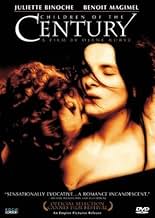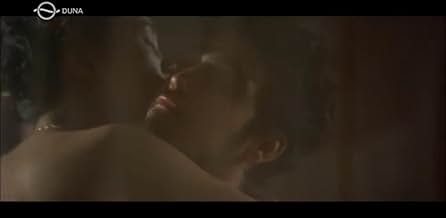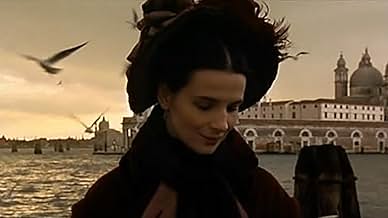Das Liebesdrama von Venedig - George Sand und Alfred de Musset
Originaltitel: Les enfants du siècle
IMDb-BEWERTUNG
6,5/10
2085
IHRE BEWERTUNG
Füge eine Handlung in deiner Sprache hinzuA story of doomed passion between two genius writers of the 19th century - novelist George Sand and poet Alfred de Musset.A story of doomed passion between two genius writers of the 19th century - novelist George Sand and poet Alfred de Musset.A story of doomed passion between two genius writers of the 19th century - novelist George Sand and poet Alfred de Musset.
- Regie
- Drehbuch
- Hauptbesetzung
Victoire Thivisol
- Solange
- (as Victoire)
Empfohlene Bewertungen
Being French, I saw this film at its release. I had no idea about what I might find except that Juliette Binoche was in it. I went there alone. I came out in a crowd.
Romanticism isn't what we think it is. This story IS romantic, not because it's a love story, but because it's a Romantics's story. George Sand and Alfred de Musset were two of our greatest writers. Their works were full of hope, of despair, of melancholy and bitterness. They were revolutionaries. This film is all about the atmosphere of that time, all about the fights and ambitions of these young writers who wanted to change the world and find an unclear future.
This film is one of the few that changed my life, not because of the way it was filmed, or the performance of the actors (though they were absolutely fabulous and I'm looking forward to their next films), it changed my perception of life, made me read some Romantic works (by Sand, Musset, Hugo, Lamartine,... and that's only for the French ones) where I found a "translation" of what I feel when I look to the world in front of me.
That's what this film is all about. It's not a film about a past true story, it's about all of us, everyday.
Romanticism isn't what we think it is. This story IS romantic, not because it's a love story, but because it's a Romantics's story. George Sand and Alfred de Musset were two of our greatest writers. Their works were full of hope, of despair, of melancholy and bitterness. They were revolutionaries. This film is all about the atmosphere of that time, all about the fights and ambitions of these young writers who wanted to change the world and find an unclear future.
This film is one of the few that changed my life, not because of the way it was filmed, or the performance of the actors (though they were absolutely fabulous and I'm looking forward to their next films), it changed my perception of life, made me read some Romantic works (by Sand, Musset, Hugo, Lamartine,... and that's only for the French ones) where I found a "translation" of what I feel when I look to the world in front of me.
That's what this film is all about. It's not a film about a past true story, it's about all of us, everyday.
"Enfants du siècle" does'nt really mean "Children of the Century", as for the contemporaries it was obvious that it meant "Heirs of the Napoleonic Saga".
This generation, Hugo, Dumas,, Musset, Nerval, Lamartine and Vigny was obsessed by the sad perception that they could not lead the heroïc, larger than life existence experienced by their fathers during the Revolution and Empire - a period (or shortly thereafter) during which they were born. They - and Aurore Dupin de Francueil (aka George Sand) with them - sought vicariously to find fame and glory in literature, particularly in theatre which was the « 7th art » of those days, and in forms of "original living" which would not surprise those reading now on the antics of 'world famous' people. In those days, that was called « Romantism ».
All of them succeeded in literature; but - even though in those days novels, essays, tales, and poems were keenly read - theatre was the big thing: a kind of Hollywood on Seine! And the successful theatre writers and performers had a fame akin to that of our Hollywood stars of today.
So this film should be seen as the biopic of two larger than life "Hollywood stars".
No surprise that passions, drugs, unfaithfulnesses and manifestations of an enormous ego are sprinkled liberally in this film. One may think of the Burton and Taylor duet, but with a wittier and more intellectual bent.
Musset, fabulously talented, has left immortal poems and several theatre pieces which have been rediscovered in the XXth century and which will last; but he has sadly wasted his talent in alcohol (absinthe mainly), drugs and philandering, prostitutes included; he died at 47.
Sand has been the more resilient of the two. She died at 71, a busy grandmother fond of country life, a true precursor of the cause of women's freedom in terms of choosing her (sometimes Saphic) lovers, espousing political causes, and communing with nature.
Sand's "original" life is her real masterpiece; it has a very modern tone. Her writings are numerous and charming, but for me, the literary genius of the two is Musset: most of his writings are masterpieces, even though his life has been a shambles.
It is no surprise then that Diane Kurys takes Sand as her lead character, against a despondent and weak Musset. And I quite understand why - to some reviewers - they both appear boorish, selfish and inspiring few sympathy. But - keeping in mind that Musset and Sand ooze talent and are their generation's Hollywood superstars - you may enjoy this well crafted biopic.
___ .
This generation, Hugo, Dumas,, Musset, Nerval, Lamartine and Vigny was obsessed by the sad perception that they could not lead the heroïc, larger than life existence experienced by their fathers during the Revolution and Empire - a period (or shortly thereafter) during which they were born. They - and Aurore Dupin de Francueil (aka George Sand) with them - sought vicariously to find fame and glory in literature, particularly in theatre which was the « 7th art » of those days, and in forms of "original living" which would not surprise those reading now on the antics of 'world famous' people. In those days, that was called « Romantism ».
All of them succeeded in literature; but - even though in those days novels, essays, tales, and poems were keenly read - theatre was the big thing: a kind of Hollywood on Seine! And the successful theatre writers and performers had a fame akin to that of our Hollywood stars of today.
So this film should be seen as the biopic of two larger than life "Hollywood stars".
No surprise that passions, drugs, unfaithfulnesses and manifestations of an enormous ego are sprinkled liberally in this film. One may think of the Burton and Taylor duet, but with a wittier and more intellectual bent.
Musset, fabulously talented, has left immortal poems and several theatre pieces which have been rediscovered in the XXth century and which will last; but he has sadly wasted his talent in alcohol (absinthe mainly), drugs and philandering, prostitutes included; he died at 47.
Sand has been the more resilient of the two. She died at 71, a busy grandmother fond of country life, a true precursor of the cause of women's freedom in terms of choosing her (sometimes Saphic) lovers, espousing political causes, and communing with nature.
Sand's "original" life is her real masterpiece; it has a very modern tone. Her writings are numerous and charming, but for me, the literary genius of the two is Musset: most of his writings are masterpieces, even though his life has been a shambles.
It is no surprise then that Diane Kurys takes Sand as her lead character, against a despondent and weak Musset. And I quite understand why - to some reviewers - they both appear boorish, selfish and inspiring few sympathy. But - keeping in mind that Musset and Sand ooze talent and are their generation's Hollywood superstars - you may enjoy this well crafted biopic.
___ .
I loved this movie and I don't know to what extent this movie is near to the original story. I have read the life of George Sand and was amazed by her character. A character so tough when it has to do with freedom of doing what one wants. George Sand was one of my best female characters next to Mary Wolstoncroft, Jane Austin, Emmeline Pankhurst and the famous five. Juliette Binoche has played the role magnificently close and made it feel like I was watching the original Sand.
The love story is so beautiful specially the scene when Benoit Magimel sleeps on the street ground under the rain when Sand comes to visit him in her carriage. Waw!... I mean this is a charming scene, it says a lot about the feelings of love.
The love story is so beautiful specially the scene when Benoit Magimel sleeps on the street ground under the rain when Sand comes to visit him in her carriage. Waw!... I mean this is a charming scene, it says a lot about the feelings of love.
Contrary to its title, this is not a movie about children in an unnamed century. Instead this movie is about the love/hate relationship between French writers Alfred Musset and George Sand. They are two souls who have a mutual and affectionate understanding of one another until a voyage to Italy reveals their true nature. Passion, envy, trust, betrayal and forgiveness are all brilliantly encompassed in the relationship between Musset and Sand.
I enoyed this movie, though some may find it dull and slow. You may need to be a die-hard romantic or like well-costumed period dramas to watch this movie. My harshest criticism for this film would be that of it's length and even though I enjoyed the turbulent relationship shown in this film, there were times when I thought that their affair had ended for good only for them to reconcile a few scenes later.
This movie is handsomely photographed with wonderful costumes by Christian LaCroix and most magnificent of all, the actors don't seem like they're acting at all. Juliette Binoche is spectacular, both beauitful and natural in her potrayal of Sand. Benoit Magimel is splendid as Alfred Musset. Don't expect historical accuracy, and if you're a romantic at heart, you will not be disappointed.
I enoyed this movie, though some may find it dull and slow. You may need to be a die-hard romantic or like well-costumed period dramas to watch this movie. My harshest criticism for this film would be that of it's length and even though I enjoyed the turbulent relationship shown in this film, there were times when I thought that their affair had ended for good only for them to reconcile a few scenes later.
This movie is handsomely photographed with wonderful costumes by Christian LaCroix and most magnificent of all, the actors don't seem like they're acting at all. Juliette Binoche is spectacular, both beauitful and natural in her potrayal of Sand. Benoit Magimel is splendid as Alfred Musset. Don't expect historical accuracy, and if you're a romantic at heart, you will not be disappointed.
Diane Kury's oppulent film is a mixed bag. In it's favour it features
real life lovers Juliette Binoche and Benoît Magimel on excellent
form. As Alfred de Musset Magimel gives us a young man
completely out of his mind on a cocktail of opium and absinthe. A
man deeply creative and talented, but unable to function as a
human being. Binoche's George Sand is a strong a determined
woman. The scene where she finds that Musset may die after
overdosing is wonderfully performed with passion and grandeur.
The film comes alive in her eyes. As filmed by Vilko Filac and
dressed by Christian La Croix, Binoche has never looked more
beautiful or sensual.
However Kurys' direction and her screenplay, co-written by
Francois Olivier Rousseau and Murray Head, lacks direction and
understanding of her period. The brothel scenes are particularly
over the top. Yet her direction of her actor is magnificent.
What is missing from Kurys' film most of all however is Sand and
Musset as writers, as creative masters. There is no sense of their
value in the film beyond their doomed love affair.
Les Enfants du Siecle is a mixed bag, but certainly worth a look.
real life lovers Juliette Binoche and Benoît Magimel on excellent
form. As Alfred de Musset Magimel gives us a young man
completely out of his mind on a cocktail of opium and absinthe. A
man deeply creative and talented, but unable to function as a
human being. Binoche's George Sand is a strong a determined
woman. The scene where she finds that Musset may die after
overdosing is wonderfully performed with passion and grandeur.
The film comes alive in her eyes. As filmed by Vilko Filac and
dressed by Christian La Croix, Binoche has never looked more
beautiful or sensual.
However Kurys' direction and her screenplay, co-written by
Francois Olivier Rousseau and Murray Head, lacks direction and
understanding of her period. The brothel scenes are particularly
over the top. Yet her direction of her actor is magnificent.
What is missing from Kurys' film most of all however is Sand and
Musset as writers, as creative masters. There is no sense of their
value in the film beyond their doomed love affair.
Les Enfants du Siecle is a mixed bag, but certainly worth a look.
Wusstest du schon
- WissenswertesGeorge Sand's estate loaned the production some of Sand's jewelry, including a sapphire ring, which Juliette Binoche wears throughout the film.
- Zitate
George Sand: Love does exist, it's not an illusion. One merely has to recognise it, and be humble before it.
- Alternative VersionenThe original French theatrical version, which runs at 135 mins begins as Sand plans to leave her husband and Musset's father dies. This version continues after their final meeting as Sand begins to write her story and attempts in vain to see Musset one last time. This version ends with a direct to camera address by Sand at Musset's tomb. A shorter theatrical version was released in Germany, Spain, UK and US which begins with Sand reading from "Lélia" and ends with Sand and Musset's final meeting. It runs at 105 mins. This version contains two new scenes: Sand and Musset being introduced to each other and a dance sequence. However the opening sequences featuring Sands arrival in Paris during an uprising and her relationship with Marie Dorval are lost, as are the closing scenes as she attempts to see Musset a final time. Most DVD releases have favored the Original 135 min version which was more critically popular.
- VerbindungenVersion of Triumph des Herzens (1945)
Top-Auswahl
Melde dich zum Bewerten an und greife auf die Watchlist für personalisierte Empfehlungen zu.
- How long is Children of the Century?Powered by Alexa
Details
- Erscheinungsdatum
- Herkunftsland
- Offizieller Standort
- Sprache
- Auch bekannt als
- Eine leidenschaftliche Affäre
- Drehorte
- Produktionsfirmen
- Weitere beteiligte Unternehmen bei IMDbPro anzeigen
Box Office
- Bruttoertrag in den USA und Kanada
- 56.611 $
- Eröffnungswochenende in den USA und in Kanada
- 8.044 $
- 15. Sept. 2002
- Weltweiter Bruttoertrag
- 381.624 $
- Laufzeit2 Stunden 15 Minuten
- Farbe
- Sound-Mix
- Seitenverhältnis
- 2.35 : 1
Zu dieser Seite beitragen
Bearbeitung vorschlagen oder fehlenden Inhalt hinzufügen

Oberste Lücke
By what name was Das Liebesdrama von Venedig - George Sand und Alfred de Musset (1999) officially released in India in English?
Antwort































